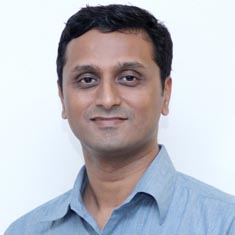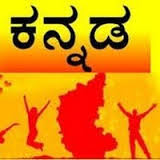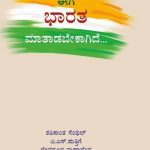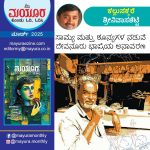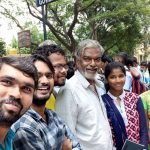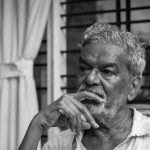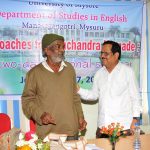‘Kannada is being strangled to death’- Chandan Gowda
[This article, written by Chandan Gowda, Professor of Sociology, Azim Premji University, published in Bangalore Mirror on 9.12.2014, was sent to Namma Banavasi by KL Chandrasekhara Aizoor. Our special Thanks to them. 9.12.2014 ರಂದು ಬೆಂಗಳೂರು ಮಿರರ್ ಪತ್ರಿಕೆಯಲ್ಲಿ ಪ್ರಕಟವಾಗಿದ್ದ ಅಜೀಂ ಪ್ರೇಂಜಿ ಯೂನಿವರ್ಸಿಟಿಯ ಸಮಾಜಶಾಸ್ತ್ರ ಅಧ್ಯಾಪಕರಾದ ಚಂದನ್ ಗೌಡ ಅವರು ಬರೆದ ಈ ಲೇಖನವನ್ನು ಕೆ.ಎಲ್.ಚಂದ್ರಶೇಖರ ಐಜೂರ್ ಅವರು ನಮ್ಮಬನವಾಸಿಗಾಗಿ ಕಳಿಸಿಕೊಟ್ಟಿದ್ದಾರೆ. ಅವರಿಗೆ ನಮ್ಮ ವಂದನೆ. ]
Devanura Mahadeva, the celebrated Kannada writer, spoke the words in the title last week while explaining his refusal to be the President of the next Kannada Sahitya Sammelana/Kannada Literature Convention (KSS). He had declined the invite in 2002 and in 1980 as well. The reason was the same each time: the government must make Kannada the medium of school instruction until the 10th standard. The KSS, he argued, is better canceled this time to awaken the government to the importance of his demand.
For those who may not know, the KSS is a mammoth literary gathering that the Kannada Sahitya Parishat hosts annually in different parts of the state. Thousands of people attend it over three days. Lakhs of books are sold. Unlike the literature festivals named after this or that city, which are often little more than glamour and networking occasions, the Sammelana is truly a festival.
In the first KSS held in 1915, its president, HV Nanjundayya, had argued that students would find it less difficult if Kannada replaced English as the language of school instruction. The President’s speeches in the subsequent 79 KSS events are passionate evidence of the confidence of Kannada intellectuals about the virtues of their language while feeling insecure about its future. “Why must Kannada be the language of higher education? Why must the linguistic dominance of English be checked?” While questions like these animated the speeches in the initial decades, other concerns surface in the post-Independence period: “How can the imposition of Hindi be resisted? How do we ensure that English medium schools make space for Kannada?” The inferiority complex ( abhimaana shunyate, as the poet, Gopalakrishna Adiga, put it) of the Kannada speakers, who did not share the regard they had for English towards their own language, is a running despair in the speeches.
Year after year, leading Kannada literary figures took stock of the predicament of their language and found it in a state of want. Despite differences in how they prioritized the problems, most of them pinned their hope on the state for securing the linguistic future of Kannada speakers (they number around 4.25 crores at present). Their exhortations to the government did not however result in a coherent language policy for school instruction. Mahadeva recalled what H M Nayak, the well-known Kannada professor at Mysore University, had told him: “As a young boy, I demanded, with pamphlets in my hand, that Kannada be made the language of school education. I am old now; I make the same demand leaning on my walking stick.”
None of the major political parties of the state have espoused the Kannada cause. Nor has a popular mobilization happened in its favour. As Mahadeva pointed out, if the government were to fall for not making Kannada the medium of instruction, it would have acted on it.
In 1994, the state government made it mandatory for all new schools to use Kannada as the medium of instruction. 2,100 schools which got their license under this new rule never kept their word and only taught in English (1,400 of these schools are in Bangalore). Only a “Don’t Ask, Don’t Tell” attitude of the state and the offending schools could have allowed a violation of law on this scale. The fact that the case filed against the government by the offending schools dragged on in the courts for twenty years shows where the sympathies of our political elite lie.
Mahadeva’s demand does seem absolute, and even impractical, in our complex educational milieu. Different kinds of schools cater to a highly varied urban community. There are newer professional pursuits. And so on. Mahadeva knows about these realities, of course. His moral stance is better viewed therefore as an urgent invitation to revisit the language question at a time when education is being fast reduced to an investment option. Creative, workable models must be found to allow Kannada and other Indian languages to breathe in schools and colleges.
-The author is Professor of Sociology at Azim Premji University
